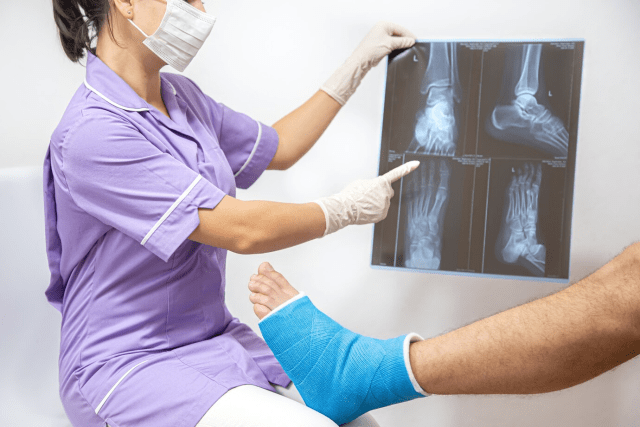
There are nearly 6 million car accidents in the United States each year, resulting in over 38,000 fatalities and millions of injuries. While some of these injuries are minor, many result in long-term physical disabilities and severe mental trauma.
Often, accident victims underestimate the extent of their injury, thinking they don’t need medical help. Unfortunately, even minor injuries can impact a person’s ability to work, drive, and simply enjoy life.
If you’ve been in a car accident due to someone else’s negligence or recklessness, you deserve compensation. Understanding which injuries are covered in personal injury claims can streamline the process. Let’s take a closer look.
Cuts and Lacerations
Cuts and lacerations are common car accident injuries caused by:
- Sharp objects, such as broken glass
- Deployed airbags
- Sharp edges of metal on the vehicle
- Loose items inside the vehicle becoming projectile
Minor cuts can be treated with first aid, however, it is always recommended to seek professional help. Deep or extensive lacerations might require cleaning, stitches, and even surgery. If not properly treated, they can lead to infections and serious complications.
Traumatic Brain Injuries
One of the most severe and devastating car accident injuries is a traumatic brain injury (TBI). These injuries result from a violent blow or jolt to the head or body. The force generated during a car collision can result in the brain hitting the inside of the skull, leading to bruising, swelling, and bleeding.
Symptoms of TBI include:
- Dizziness
- Confusion
- Headache
- Blurred vision
- Tired eyes
- Ringing in the ears
Traumatic brain injuries can also impact cognitive functions, such as memory, attention, and problem-solving.
The most dangerous thing about a TBI is that it often goes undetected. A person might lose consciousness for a few seconds or minutes and feel fine later on. If not addressed promptly, the symptoms can worsen, causing seizures, slurred speech, and permanent cognitive impairment.
Spinal Cord Injuries
Back and spine injuries often occur due to the intense force of a car crash. Sudden impact can lead to fractures, dislocations, and compression in the spine. Spinal cord injuries can cause life-altering conditions, including partial or complete paralysis.
The recovery from spinal cord injuries is quite extensive, often involving surgeries, physical therapy, and assistive devices. The financial and emotional toll can hinder day-to-day life.
Fractures
Fractures are some of the most common car accident injuries, with the arms, legs, and collarbones typically affected. Symptoms include intense pain and difficulty moving the affected area. Depending on the severity of the collision, a broken bone might heal with a cast or require surgery.
Broken bones can also pose additional risks. For example, rib fractures might pose a threat to the internal organs. Quick medical attention is critical for stabilizing the victim and taking the necessary steps.
Whiplash
Whiplash is an injury that occurs when sudden force or movement jerks the neck forward and backward, straining your neck and spine. The sharper and stronger the movement, the greater the force on your neck. Symptoms of whiplash include:
- Stiffness when moving the neck
- Bruising and swelling around the head, face, and shoulder
- Headaches
- Muscle weakness
Healthcare providers treat whiplash as an emergency. They will assess your neck and stabilize it before moving you out of the car.
Internal Injuries
As the name indicates, internal injuries are less visible than external injuries. But they can be equally profound. This includes:
- Internal bleeding
- Collapsed lung
- Broken ribs
- Organ damage
- Ruptured spleen
Victims of side- or front-impact accidents are more likely to suffer from internal injuries.
Soft Tissue Injuries
Soft tissue injuries affect the muscles, tendons, and ligaments throughout the body. When muscles or tendons are stretched beyond their normal range, it can lead to strains and sprains.
Bruising, swelling, and pain in the affected area are common signs of soft tissue injuries. While they are not as painful as spinal cord injuries or fractures, they can worsen if precaution is not taken.
Mental and Emotional Distress
Car accidents leave emotional injuries as well. Victims might experience fear, anxiety, and even post-traumatic stress. They might face upsetting flashbacks and develop an irrational fear of driving.
While some mental challenges might not appear likely right after an accident, they can appear over time. This can make navigating daily life overwhelming.
Compensation You Can Get for Car Accident Injuries
In most U.S. states, people who have been injured in a car accident due to someone else’s negligence are eligible for financial compensation, commonly known as damages. You can seek the following types of damages:
- Medical expenses, including emergency care, hospital bills, prescriptions, and tests
- Loss of wages, if your injury prevented you from working
- Loss of future earning capacity, if you’re unable to return to work and provide for your family
- Pain and emotional distress
- Loss of enjoyment of life
- Punitive damages, if the at-fault driver acted with gross negligence
The amount of compensation depends on various factors, such as:
- Your age
- Position in the household
- Present and future earning capacity
- Severity of the injuries
- State laws and regulations regarding personal injury claims
To better understand state and city regulations, consider working with a personal injury lawyer specializing in car accident cases. If you’re living in West Virginia, work with a competent West Virginia accident lawyer to ensure compliance and increase your chances of getting fair compensation.
The Role of an Accident Lawyer
After a car accident, especially one involving physical and emotional injuries, a lawyer can play a critical role in protecting your rights. Many accident victims don’t realize how complex and exhausting the process of filing for personal injury claims is. You need to communicate with insurance adjusters, handle mountains of paperwork, and comply with a strict timeline.
A personal injury lawyer can take a significant load off your shoulders. From gathering evidence to communicating with insurance companies and building a case, their knowledge and experience can make a world of difference. They will negotiate for the highest possible settlement on your behalf. If a settlement isn’t reached, they can represent you in court in front of a judge or jury.
Lastly, hiring a car accident lawyer can give you the space and emotional capacity to heal from a traumatic event and resume day-to-day activities. They are committed to getting you justice and fair compensation.










